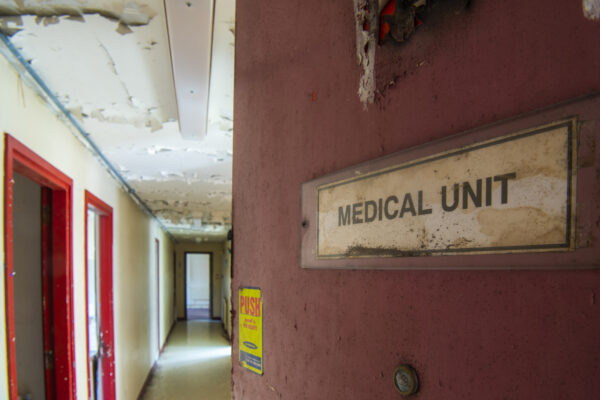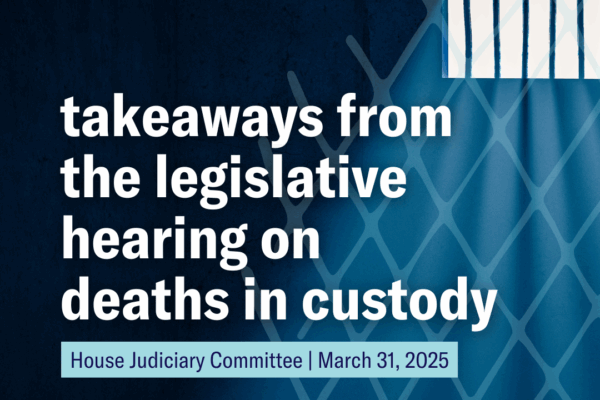Today, the House Community and Regional Affairs committee in the Alaska Legislature canceled a scheduled hearing on deaths of Alaskans in Department of Corrections (DOC) custody, which have occurred at record rates since 2022.
After committee chair Representative CJ McCormick called the properly noticed hearing to order shortly after 8:00 am, Representative Kevin McCabe objected to the hearing. McCabe relied on a parliamentary rule regarding legislative bodies holding hearings that involve issues that are currently in litigation. The purpose of the hearing was to listen to experts and Alaskans impacted by the record number of deaths in DOC facilities and did not focus on a particular legal case. Still, the committee voted 4-3 against holding the hearing, and Chair McCormick was forced to adjourn the meeting.
Jacqueline Shepherd, Prison Project Intake Attorney for the ACLU of Alaska was scheduled to testify as the investigator of each death that occurs in a DOC facility. Because her experience is critical to understanding the deaths that are occurring, we are sharing her testimony and summary report of the deaths to ensure that the stories of the Alaskans who have died and their families are being brought to light and are never forgotten. Read her testimony below.
My name is Jacqueline Friedman Shepherd and I am the Prison Investigator and Intake Attorney for the ACLU of Alaska’s Prison Project. The prison project was started almost three years ago with the goal of improving conditions of confinement and reducing the number of incarcerated people in Alaska. I want to offer my sincere thanks for taking the time to hear us out today. This work is more than a job to me and it feels like great progress to have the chance to present my findings to you, who have the power to potentially make a difference.
I’m going to start by telling you a little bit about how I do my job. I am going to tell you what I have found since I began investigating Alaska Prisons. Then I will pass it off to Dean [Williams] to tell you how to fix it. If you wait to ask questions until we are both done, he may answer some of the questions I plant in your mind.
I was on the phone with my son the other day and he said, “Mom, the Rabbi asked me what your job is and I didn’t know how to tell him.” The truth is, it’s difficult to describe my job, in part because the ACLU prison project is the only organization in the state – government agencies included – that is investigating conditions and wrongdoing within the Department of Corrections. From what I can tell, Alaska is the only state that does not have an independent office or unit dedicated to investigating problems within the DOC.
So, what is my job? Basically, I am the only person who answers the call when people have concerns with DOC conduct, lack of care, or prison deaths.
What does that look like?
I have spent thousands of hours talking to inmates, family of inmates, corrections officers, former DOC employees, superintendents, concerned citizens, doctors, nurses, attorneys, court employees, judges… I talk to anyone and everyone who plays a part in our criminal justice and prison system.
My office has more letters piled in the corners than Santa’s office at the North Pole. My phone rings all day and night with calls from every DOC institution in the state and from the families of people in those facilities.
When deaths are reported by DOC, I immediately send a preservation letter to preserve all evidence related to the time surrounding that person’s death, in part because the DOC does not provide records to family or attorneys until a lawsuit is filed against them.
I also assist families in opening probate cases for their deceased loved ones because this is the only way DOC will release even partial medical records of deceased inmates.
I also answer texts and emails at 3 am because I don’t have the luxury of dictating when a mother or grandfather is ready to talk about their child who died in DOC custody.
What have I found? I have found that Alaska may have the highest rate of prison deaths in the country.
36 people have died in Alaska prisons since 2022. 36 may not sound like a high number, so let me put this in perspective. New York City has 10,000 prisoners. Alaska has less than 5000. In 2021 19 inmates died in NY City prisons. In 2022, 18 people died in Alaska prisons. The federal courts in New York intervened in 2021 and threatened to relieve the City of New York of its responsibility for the prisons because 19 deaths is unacceptable. Alaska’s 18 deaths with half as many inmates means we had twice as many deaths.
Let me share some numbers with you.
21 of 36 were either pretrial, charged with a non-violent misdemeanor, or were in on a technical violation of parole or bail conditions.
50% of those who have died in Alaska Prisons since 2022 are Alaska Native people. Considering Alaska Native people only make up 22% of Alaska’s population, that is a staggering statistic.
Only 12 of the 36 deaths were people over 60 years old.
10 of the 36 deaths were people between the ages of 40 and 60.
14 of the 36 deaths were people under 40 years old. Six of those were in their 20s. Of those who died in their 20s, every one of them was either pretrial, charged with a non-violent misdemeanor offense, or in on a technical violation of their conditions of release.
I’m not talking about people in prison for life for committing heinous crimes against others (though I would and do advocate for humane treatment of those people, too).
I am talking about Kitty Douglas, a 20-year-old who was arrested for yelling at officers when they were turning people away from the Sullivan Arena, Anchorage’s temporary homeless shelter at that time. Kitty was never charged with any crime. Her caseworker called the prison to tell them she was suffering from serious mental health issues since suffering a late-term miscarriage. Kitty died of suicide in solitary confinement.
I am talking about 27-year-old Mark Cook, Jr. who was arrested for screaming in the hospital when medical staff gave him a painful Toradol shot in his spine while he awaited a future scheduled back surgery. Mark was transported to Lemon Creek Correctional Center and was placed in solitary confinement because his moans of pain were disruptive to other inmates. Mark died by suicide in solitary confinement.
I am talking about 31-year-old James Rider who was on ankle monitor house arrest for over two years, awaiting trial for a misdemeanor assault charge. James begged his probation officer for mental health help for nearly a year, then finally cut off his ankle monitor and was arrested. James died by suicide a day after being released from suicide watch.
Let’s review that statistic one more time: 21 of the 36 people who died in DOC custody since 2022 were incarcerated on a non-violent misdemeanor, were pretrial, or were in on a technical bail or parole violation.
Through my investigation, I also found that DOC is not reporting all its deaths and not giving families accurate information about the deaths of their loved ones.
When planning for today, I expected to talk to you about the three unreported deaths that I uncovered in 2023, but in the past few weeks, I have uncovered a murder that occurred in DOC custody that was never reported to the family. Unfortunately, I had to be the one to break the news to this young man’s father that his son, who they were told by DOC had died of natural causes or a drug overdose, had actually been murdered. The father then contacted the troopers, and they confirmed his son’s death was a homicide. I cannot give more details at this time because the father has not yet told his other children their brother was murdered and he asked me for some time before this information goes public. I can tell you that this young man, who was under 40, was in prison on two misdemeanor charges.
This is not the first time the DOC has told a family their loved one suffered a drug overdose when that was incorrect. A gentleman who was remanded on a parole violation for driving without a license was transported to the hospital in a coma in April of 2023. The DOC told hospital staff he had an overdose and had been combative with staff, so was transported in leg and arm shackles with a spit hood on. Hospital staff spent over an hour administering ketamine and Narcan, only to discover he had no drugs in his system and was in a coma with advanced spinal meningitis that had gone untreated for weeks, despite his pleas, and eventually the pleas of his fellow inmates, for medical attention. He was in a coma in the hospital for three or four days before his family was contacted by DOC. They, too, were told he had fallen into a coma after a drug overdose. When they finally were able to get in contact with hospital staff, they were told he had no drugs in his system and his death should have been entirely preventable. While he was in a coma, the DOC granted him parole without a hearing, despite the fact that he had not applied for parole. After two painful months in the hospital, he passed away. DOC did not alert the medical examiner that his death occurred in DOC custody, so the body was shipped to his family out of state, then had to be returned to the Alaska Medical Examiner, then shipped back to his family. DOC still has not reported this as a DOC death.
I was contacted by an attorney and family members of two other people who were transported to the hospital by DOC in a coma or brain dead, then released or had their charges dropped, so DOC did not report their deaths.
This should be extremely concerning for two reasons: (1) We are not getting an accurate account of how many deaths are occurring in DOC custody and if I discovered three in less than six months, how many others have not been reported? And (2) the deaths I uncovered are the deaths of people who had family members who knew they passed away and knew to contact someone about it. Many incarcerated Alaskans are arrested away from their home village, or suffer from mental illness or homelessness that interferes with their families knowing if they even are missing. I’m not sure if you are aware that people who are being held on Title 47 holds – that is a mental health hold not attached to any criminal charges or activity – cannot be found on Court View or Vinelink the way regular inmates can be found, so families of those people have no way of knowing their relative is actually in prison. How many of those people may have been dropped at the hospital by DOC and their families were never even told they had been in custody prior to their deaths?
We need oversight, accountability, and transparency. I should not be the only person people can call to report concerns or wrongdoing. I should not be the person who walks families through the process of how to get a report from the Medical Examiner or how to request medical and institutional records. And to be clear, I am not only talking about inmates. I am also the person concerned hospital workers and DOC officers and staff are calling when they have concerns about DOC conduct. They have nowhere to report their concerns or complaints because they fear retaliation and their pleas for change have been ignored by those with the power to make change.
I know I just hit you with a ton of facts and new information. Much of what I have just told you is provided in the memorandums and reports we distributed to you prior to this hearing. I am also happy to meet with or talk to any of your offices and provide more details or answer more specific questions at any time. It’s my job!
If there are no urgent questions, I would like to pass this off to Dean Williams who will discuss potential solutions.
The ACLU of Alaska remains committed to holding our government accountable for deaths that have occurred in DOC custody and advocating for changes to the department that will make conditions safer and investigative processes more transparent.




